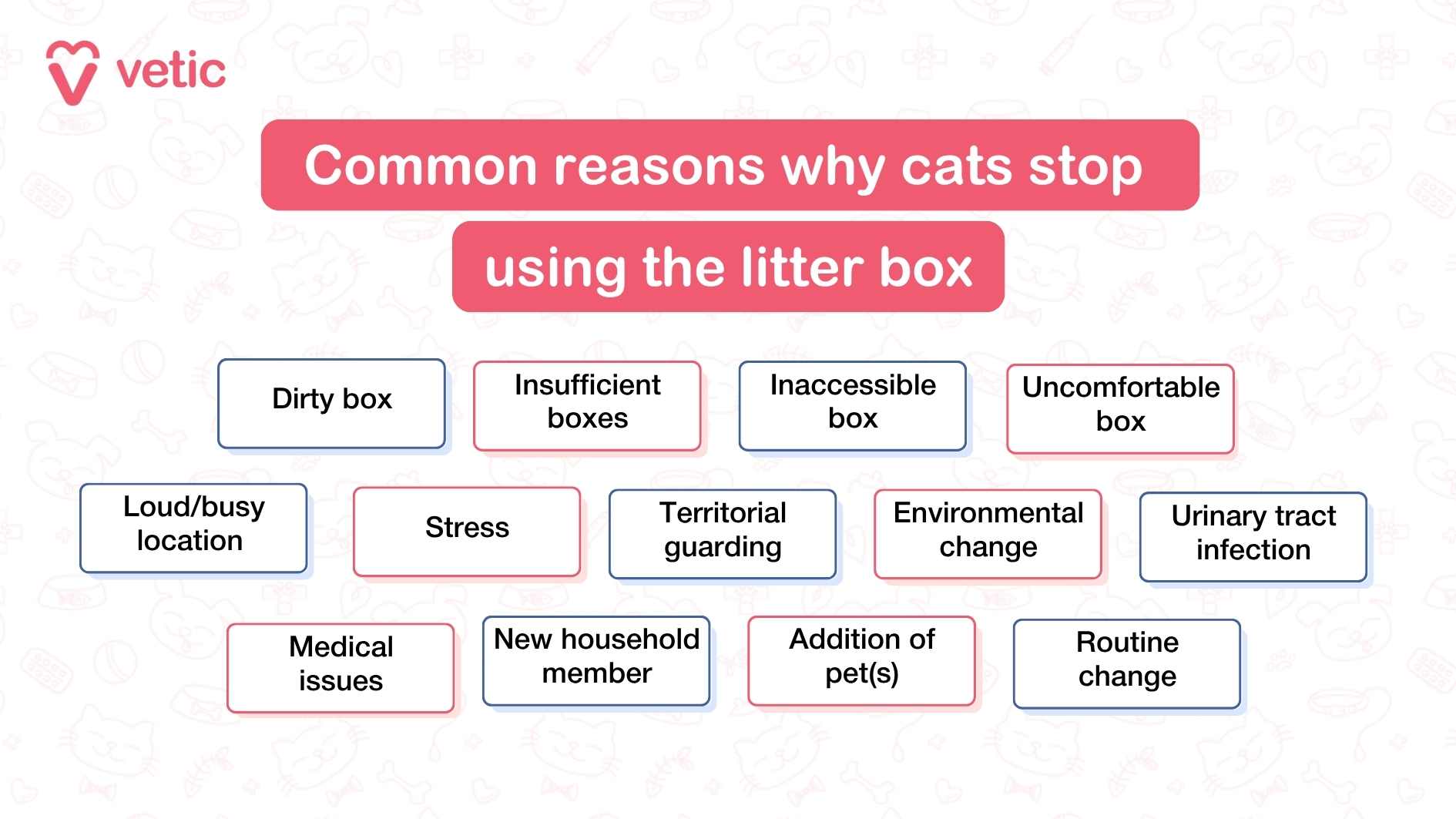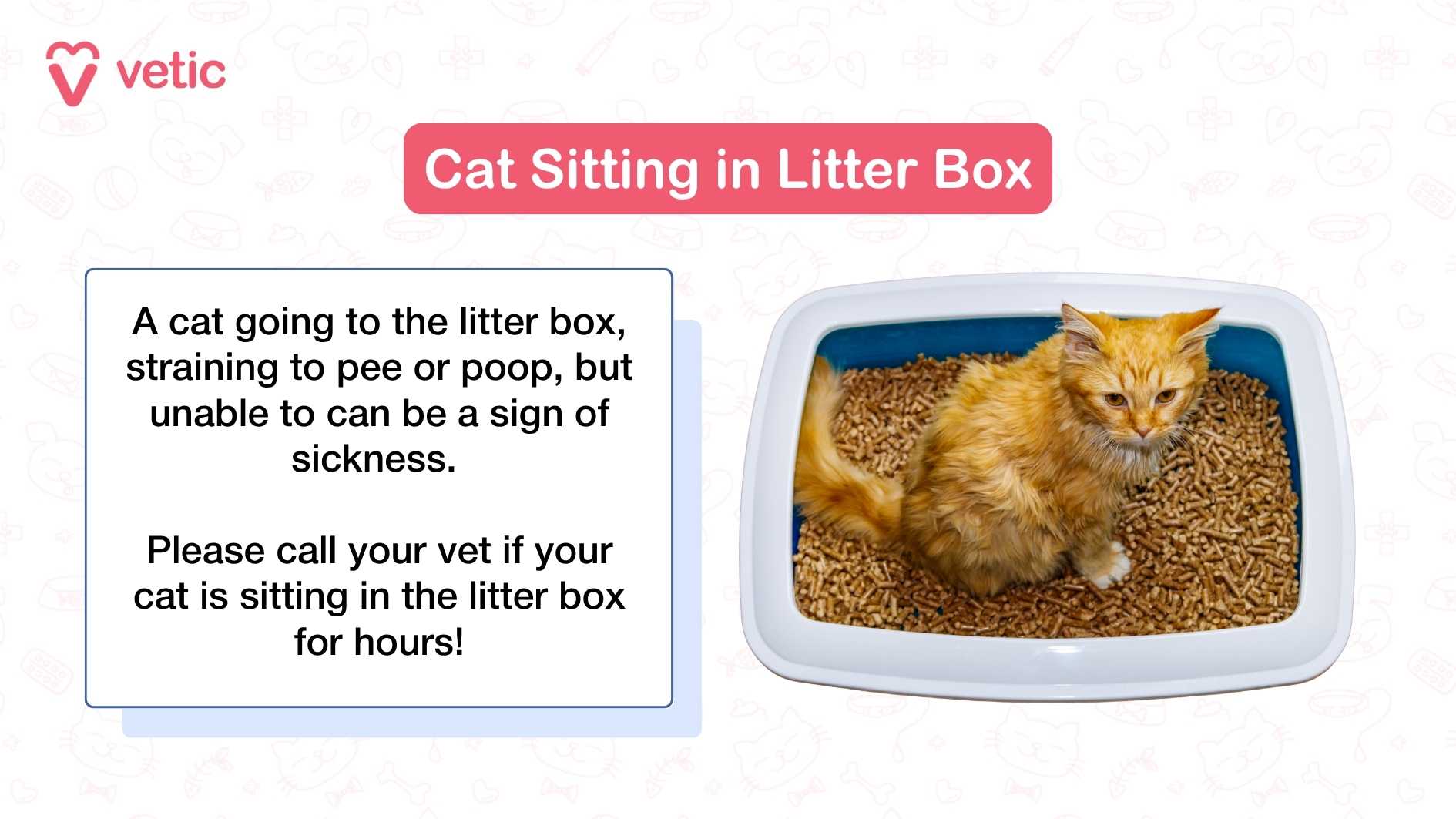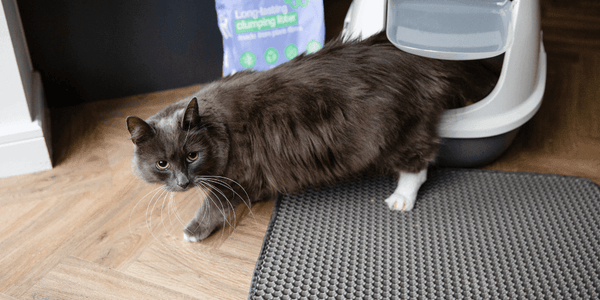Are you frustrated with your cat urinating outside of the litter box? You’re not alone.
Many cat owners face this perplexing issue, and it can feel like a mystery to solve. Understanding why your feline friend might be avoiding their litter box is crucial to finding a solution. Could it be a health problem, stress, or something else entirely?
We’ll uncover the common causes behind this behavior and offer practical solutions to help you restore harmony in your home. Keep reading to discover how you can help your cat return to their litter box and ensure a peaceful, clean environment for both of you.

Credit: vetic.in
Common Medical Issues
When your cat suddenly starts urinating outside the litter box, medical issues are often the hidden cause. Ignoring these signs can lead to serious health problems for your feline friend. Understanding common medical issues helps you spot trouble early and get your cat the care it needs.
Urinary Tract Infections
Urinary Tract Infections (UTIs) are a frequent culprit behind inappropriate urination. A UTI causes pain and urgency, making your cat avoid the litter box. You might notice your cat licking its genital area more often or crying while urinating.
It’s important to consult your vet if you see these signs. A simple urine test can confirm the infection, and antibiotics usually clear it up fast.
Bladder Stones And Crystals
Bladder stones and crystals irritate your cat’s urinary tract, causing discomfort and frequent urination. This often leads to accidents outside the box because your cat associates pain with the litter area.
Diet changes or surgery might be necessary, depending on the severity. Have your vet check your cat’s urine for crystals or stones if you notice frequent or painful urination.
Kidney Disease
Kidney disease affects how your cat processes fluids, often increasing urine output. This can lead to more frequent trips outside the litter box, especially if your cat struggles to reach it in time.
Early detection through blood and urine tests can slow kidney damage. Watch for increased thirst and urination along with changes in behavior or appetite.
Diabetes And Other Illnesses
Diabetes causes excessive thirst and urination, which may confuse your cat’s bathroom habits. Other illnesses like hyperthyroidism can also trigger similar symptoms, disrupting normal litter box use.
These conditions need veterinary diagnosis and management to keep your cat comfortable. Have you noticed your cat drinking more water or losing weight unexpectedly? These are clues that should not be ignored.
Behavioral Causes
Behavioral causes often explain why your cat might choose to urinate outside the litter box. These reasons stem from your cat’s mental state, environment, and habits rather than medical issues. Understanding these behaviors helps you address the root cause and improve your cat’s comfort and cleanliness.
Stress And Anxiety
Stress can make any cat act out, including urinating in unusual places. Changes like a new pet, loud noises, or even a move can trigger anxiety. Have you noticed your cat hiding more or acting restless? These signs often go hand in hand with litter box problems.
To help, create a calm environment. Use calming sprays or pheromone diffusers. Giving your cat a quiet safe space can reduce stress and encourage proper litter box use.
Territorial Marking
Cats mark territory by spraying urine, especially if they feel threatened by other cats. This behavior is common in unneutered males but can occur in any cat. Are there new animals or changes in neighborhood cats that might make your cat feel the need to mark?
Neutering helps reduce this behavior. Also, keep your cat indoors if possible and clean marked areas thoroughly with enzymatic cleaners to remove scent traces.
Changes In Household
Any household change can disrupt your cat’s routine and cause accidents. New furniture, visitors, or even changes in your schedule can confuse your cat. Have you introduced anything new recently that could unsettle your pet?
Try to maintain a consistent routine and gradually introduce changes. Provide extra attention and reassure your cat to help them adjust smoothly.
Litter Box Preferences
Your cat might avoid the litter box due to preferences about its location, cleanliness, or type of litter. Cats are picky and may reject boxes that are too small, dirty, or placed in noisy areas. When was the last time you cleaned the box or tried a different litter?
Offer multiple boxes in quiet spots and scoop them daily. Experiment with different litter types to find what your cat prefers. Small changes here can make a big difference in your cat’s behavior.
Litter Box Problems
When your cat starts urinating outside the litter box, one of the first things to check is the litter box itself. Issues with the box can frustrate your cat and push them to find other places to go. Understanding common litter box problems can help you create a more inviting space that your cat will want to use consistently.
Box Cleanliness
Cats are very clean animals and may avoid a litter box that isn’t cleaned regularly. If the box smells or has too much waste, your cat might look for a fresher spot. Try scooping the litter at least once a day and fully changing it weekly to keep your cat comfortable.
Have you noticed your cat sniffing around then walking away? That could be a sign the box isn’t clean enough for their liking.
Box Location
Where you place the litter box matters a lot. A noisy or busy area might scare your cat or make them feel exposed. Cats prefer quiet, private spots where they won’t be disturbed.
Think about your own privacy needs—would you want to use a bathroom in the middle of a crowd? Your cat feels the same way.
Type Of Litter
Your cat might dislike the type of litter you use. Some cats prefer clumping litter, while others like non-clumping or even natural materials like wood or paper. The texture and scent can make a big difference in their willingness to use the box.
If your cat suddenly stops using the box, try switching to a different kind of litter to see if that helps.
Number Of Boxes
Having enough litter boxes is crucial, especially if you have multiple cats. The general rule is one box per cat, plus one extra. This reduces competition and stress, which can cause your cat to avoid the box.
Could your cat be avoiding the box because another cat is always there? Adding another box might solve the problem quickly.

Credit: www.reddit.com
Environmental Factors
Environmental factors play a significant role in why cats may choose to urinate outside their litter box. Cats are creatures of habit and can be sensitive to changes around them. Understanding these factors can help you identify the root cause and create a more comfortable space for your feline friend.
New Pets Or People
Introducing a new pet or person into your home can disrupt your cat’s sense of security. Cats often feel threatened or stressed by unfamiliar scents or behaviors, leading them to mark territory by urinating outside the litter box. Have you noticed your cat acting more distant or restless after a new arrival?
To ease this transition, give your cat a quiet space and gradually introduce new family members or pets. Use pheromone diffusers or sprays to help reduce anxiety. Observing your cat’s behavior closely during this time can prevent accidents and build trust.
Moving Or Renovations
Moving to a new home or undergoing renovations can be very unsettling for cats. The change in environment, noises, and unfamiliar smells can cause stress. It’s common for cats to express their discomfort by avoiding the litter box.
Try to keep your cat’s routine consistent during these times. Set up a safe, quiet room with their litter box and favorite toys while the rest of the home is chaotic. Could creating a calm zone help your cat feel more in control?
Outdoor Access
Access to the outdoors can influence your cat’s bathroom habits. Outdoor cats might prefer to relieve themselves outside or get distracted by outdoor stimuli. On the other hand, if access is suddenly restricted, your cat may feel trapped and stressed.
Consider how changes to outdoor access affect your cat’s behavior. Providing a secure outdoor enclosure or supervised outdoor time can satisfy their natural instincts. What outdoor options does your cat have, and how might they impact their litter box use?
How To Address The Issue
Addressing the issue of cats urinating outside the litter box requires patience and a clear plan. Understanding the root cause helps you choose the right approach. You might find that a combination of solutions works best for your furry friend.
Veterinary Checkup
Start with a visit to the vet to rule out medical problems. Urinary tract infections, kidney issues, or diabetes can cause your cat to avoid the litter box. A simple urine test or physical exam can quickly identify health concerns.
Ignoring health problems can make the behavior worse. Have you noticed any other signs like frequent urination or discomfort? These clues can guide your vet in diagnosing your cat’s condition.
Improving Litter Box Setup
Your cat’s litter box might not be as inviting as you think. Clean the box daily and scoop waste frequently to keep it fresh. Cats prefer a clean, quiet, and easily accessible bathroom spot.
Try changing the type of litter or adding more boxes if you have multiple cats. Some cats dislike covered boxes or strong-smelling litter. Watch your cat’s preferences and adjust accordingly.
- Place boxes in quiet, low-traffic areas
- Keep one box per cat plus one extra
- Use unscented, clumping litter
Reducing Stress
Stress can trigger inappropriate urination in cats. Changes like moving, new pets, or loud noises can upset their routine. Observe if your cat’s accidents coincide with stressful events.
Create a calm environment with safe spaces for your cat to retreat. Use pheromone diffusers or calming sprays to ease anxiety. Sometimes, simple changes like consistent feeding times help your cat feel secure.
Behavioral Training
Training your cat to use the litter box again takes time and positive reinforcement. Reward your cat with treats or affection when they use the box correctly. Avoid punishment, as it may increase anxiety and worsen the problem.
Consider using clicker training or gently guiding your cat back to the box after accidents. Patience is key—repeat good experiences will build a habit. Have you tried tracking your cat’s routine to catch signs before accidents happen?

Credit: vetic.in
Frequently Asked Questions
Why Do Cats Urinate Outside The Litter Box?
Cats may urinate outside the litter box due to stress, medical issues, or dirty litter. Changes in routine or environment can also trigger this behavior.
Can Health Problems Cause Litter Box Avoidance?
Yes, urinary tract infections, bladder stones, or kidney disease can make urination painful, causing cats to avoid the litter box.
How Does Litter Box Cleanliness Affect Urination?
Cats dislike dirty litter boxes. Regular cleaning prevents odors and encourages cats to use the box consistently.
Can Stress Make Cats Urinate Outside The Box?
Stress from new pets, moving, or loud noises can cause cats to urinate outside the litter box as a coping mechanism.
Conclusion
Cats urinating outside the litter box can have many causes. Stress, health problems, or litter box issues often play a role. Watch your cat’s behavior closely to spot changes early. Keep the litter box clean and in a quiet place.
Consult a vet if the problem continues or worsens. Understanding your cat helps keep your home clean and your pet happy. Small changes can make a big difference. Stay patient and caring to help your cat feel safe.

